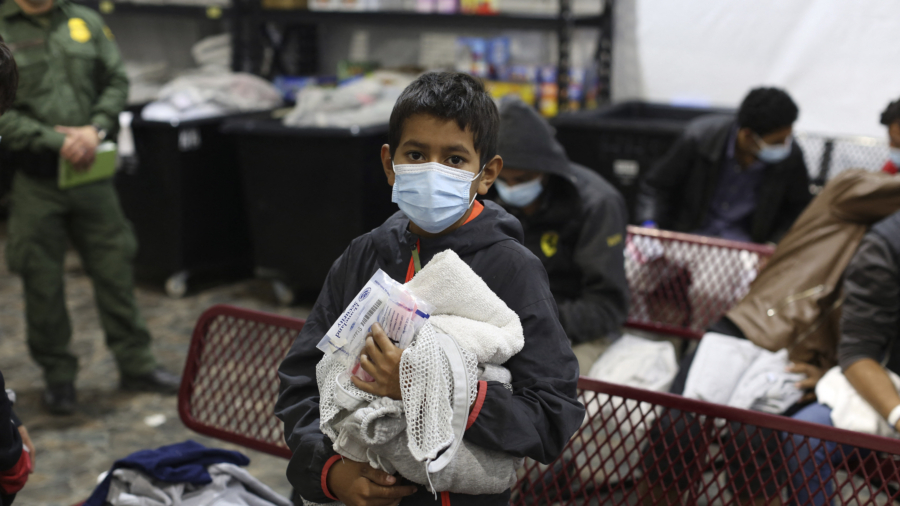Unaccompanied children who crossed the U.S. border alone and were temporarily sheltered in a Texas military base last year suffered from distress, anxiety, and panic attacks without receiving quality services that prioritize their safety and well-being, shows a September watchdog report.
In the 58-page report (pdf) issued last week by the Department of Health and Human Services (HHS) inspector general’s office, investigators found that some illegal immigrant youth at the emergency shelter inside Fort Bliss had to wait weeks before hearing updates from case managers due to large caseloads, COVID-19 related manpower shortages, and lack of staff training.
“This lack of communication contributed to what another interviewee called ‘a pervasive sense of despair’ among children at the facility, who reportedly experienced distress, anxiety, and in some cases, panic attacks,” the report said.
The emergency site on Fort Bliss was firstly open in March 2021 to meet basic standards of child care for unaccompanied children on a short-term basis, as the country saw an enormous spike in illegal immigrants since President Joe Biden took office.
The number of minors who arrived at the southern border without a parent or legal guardian and were referred to the care of HHS, rose steeply from less than 2,000 in October 2020 to over 20,000 in April 2021.
Near the end of May, 700 children at the military base had not been seen by a case manager for approximately 60 days, according to a case management team member. Similarly, a youth care worker recalled compiling a list of nearly 100 children who had been at the facility for more than 30 days without frequent communication with case management staff, while many had not been contacted after their initial intake interview.
The investigation included document analyses, a site visit last June, and interviews with 66 Fort Bliss staff from June 11 to Dec. 17, 2021.
“Interviewees shared children’s fears of being forgotten by case management staff, which led to uncertainty about when they would be released from the facility and reunited with their family or other sponsors,” the Office of Inspector General found.
Another staff told investigators that a young girl begin to hit and cut herself in front of a group of children after learning that her mother had not yet been contacted by a case manager as part of the sponsor screening process.

An HHS official, speaking on the condition of anonymity, told Reuters that conditions at Fort Bliss now are “night and day” compared to then. There are currently 589 children at the base, the official said, and children stay, on average, for 13 days before being released to parents or other sponsors.
HHS had resorted to opening a total of 14 temporary emergency intake sites last year, including military bases like Fort Bliss, in a bid to house them before being placed with sponsors across the country.
Children sent to such unlicensed, short-term facilities, however, described crowded living conditions, spoiled food, lack of clean clothes, and mental depression, according to child testimonials filed in court in June 2021.
HHS closed 12 of the 14 sites by January 2022, and converted the remaining two facilities, including the one at Fort Bliss and the other at Pecos, to influx care facilities in May and June 2022, respectively, meaning the two must meet minimum standards of care for licensed facilities now.
Retaliation
The report also flagged that last year, government workers feared potential retaliation for raising concerns about youth treatments on the military base—an allegation denied by the unnamed HHS official, who said the agency would not retaliate against someone for raising a child welfare concern.
Two U.S. government employees, according to the report, said they experienced retaliation after they sounded alarms about the conditions at Fort Bliss. The alleged acts of retaliation, which included demotion and removal from assignments, may have caused a broader “whistleblower chilling,” the inspector general’s office said, “effectively scaring staff into withholding any complaints or reports of wrongdoing.”
A staffer was allegedly demoted and transferred after raising concerns about the treatment of children at the base and the removal of certain safety checks in the program to release children to sponsors.
The Epoch Times has reached out to the HHS for comments.
Reuters contributed to this report.
From The Epoch Times


